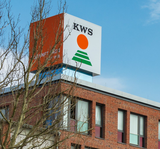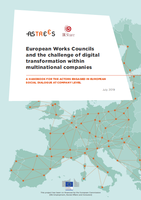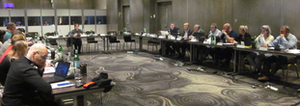 |
| Download pdf file | Newsletter archives | |||
| Dieser Newsletter auf Deutsch | Cette newsletter en français | |||
1. Brexit and European Works Councils |
 |
|
Will the United Kingdom stay together?
Scotland's quest for independence received a new boost with the election. The Scottish National Party SNP won three quarters of all Scottish Parliamentary seats and sees this as an argument for a second independence referendum. In Northern Ireland, Irish nationalists received more votes than pro-British unionists for the first time since the breakaway from Ireland in 1921. The latter feel betrayed by Boris Johnson through the EU withdrawal agreement which provides for a customs border between Great Britain and Northern Ireland. This could bring a debate on the future of Northern Ireland or a possible reunification of the island on the agenda. Even in Wales, as early as 2018, the leader of the regional party there warned of the "dying days of the British state".
Election analysis by the Friedrich-Ebert Foundation Outlook on forthcoming negotiations
The legal situation from 1st February 2020
With the withdrawal from the EU, almost nothing will change at first, since the withdrawal agreement includes a transition period until 31 December 2020 - which may be extended once up to the end of 2022 at the latest. During this period the country is no longer a member of the EU, but must continue to adhere to EU rules without having a say (comparable to Norway). During the transition period, the future relationship with the EU will be negotiated, including the question of social standards and the further application of the EWC Directive. Should these negotiations fail, a no-deal Brexit ("cliff-edge") will occur. Therefore, the critical moment that the business community has warned of in recent months has merely been postponed into the future. For European works councils, SE works councils and special negotiating bodies nothing will change legally during the transition period. Delegates from the UK will retain their seats and vote just like delegates from Norway. EWC agreements based on British law will also remain valid. The Central Arbitration Committee (CAC) in London will continue to be responsible for complaints.
Brexit recommendations from European trade unions (September 2018) Opinion of the ETUC on the October 2019 Brexit Agreement
Establishing a EWC in the wake of Brexit
Management was speculating that EWC legislation would no longer apply in the United Kingdom on the day after Brexit and consequently would not have to establish a EWC. As a result there were virtually no negotiations at all during the first two years. Serious talks only began once the Brexit was postponed in spring 2019. The SNB was able to elaborate a draft agreement on 17 and 18 June 2019 at central management headquarters in Friedrichsdorf (near Frankfurt) from then on with the support of the EWC Academy. However no agreement could be reached since the positions of both parties were so far apart from each other and there was insufficient time left for meetings. Another "default" EWC will therefore be established shortly, which is now becoming more and more common in US companies (see report in EWC News 2/2019). Bose falls under German jurisdiction. |
 |
2. Who pays the legal fees for EWC court proceedings? |
 |
|
Historically significant ruling in London
In the past, complaints from European works councils for first-instance proceedings before the CAC were usually filed by trade union officials, since there was no legal obligation to have a lawyer. In only one case, for which the payment of legal fees was an issue, the costs were finally paid by the company "voluntarily" as part of an out-of-court settlement (see report in EWC News 1/2016). The new decision of the CAC strengthens European works councils operating under British jurisdiction. Up to now, many of them could not manage to take legal action since the responsibility for bearing the cost was not clear. Now the same regulations as in Germany also apply to the United Kingdom: the works council files a complaint and the employer pays both lawyers, its own and that of the works council.
Full text of court ruling (see from page 25 on)
Break with traditional Anglo-Saxon model of labour relations
Anglo-Saxon managers are used to negotiating exclusively with trade unions since works councils did not exist before. In the case of any legal proceedings, each party pays for its own lawyer. Why should it be any different for works councils? The difference is that trade unions only represent their members, who pay union-dues voluntarily. The works council on the other hand represents the entire workforce and members are elected by everyone whether they belong to a trade union or not. In most countries the council does not have its own budget, but represents a cost centre (department) within the company with special rights. The company pays for any equipment, training and experts, which is necessary for its activities. This also includes lawyers. The EU Directive on European works councils and the Directive on Information and Consultation in the workplace in force since 2005 are both based on this philosophy. In the UK and Ireland this represents a break with the traditional labour relations, which has prevailed there since the industrial revolution. Recently this has also been reflected in the debates on employee participation in Corporate Governance (see report in EWC News 4/2018).
The situation in other countries
In France works council have their own budget, which amounts to at least 0.2% of the gross company payroll according to law. The employer transfers this money to the work council´s bank account. It may be used to finance any legal action. Usually European works councils under French jurisdiction also have their own budget. If the EWC wins a legal case, it may refuel its bank account with any fines imposed on central management (see report in EWC News 2/2019). There are also legal provisions for a dedicated European works council budget in Poland. However at present there is only one EWC operating under Polish jurisdiction (see report in EWC News 3/2016).
Works councils In Austria generally have their own budget, taken from the works council contributions which all employees in the company pay. It can total up to 0.5% of the gross payroll and the amount is decided during a general employee assembly. On the other hand, European works councils under Austrian jurisdiction have no dedicated budget to pay for any lawyers. There is currently a legal case for the first time before the Vienna Labour and Social courts where this question plays an important role. The central management of Mayr-Melnhof Packaging has refused - as in the Verizon case in London - to bear the costs of lawyers (see report in EWC News 3/2019).
In Italy legal proceedings are currently underway against the family-run business Sofidel, which is refusing to convene the EWC constitutional meeting and to bear the travel expenses. The legal case is being financed by the trade unions (see report in EWC News 1/2019). The works council members have so far not attempted to oblige Sofidel central management to bear court and legal costs. |
 |
3. Court ruling on consultation rights |
 |
|
Another US company loses against its EWC
Course of events at Verizon
An extraordinary meeting of the EWC select committee was convened on 10 January 2019 in London on the initiative of central management. The members were informed of restructuring planned in eight countries with 216 redundancies. The meeting lasted from 10 a.m. to 12.30 p.m. including one half-hour internal discussion of the employee representatives. All documents were declared to be "strictly confidential". Under these circumstances, the French EWC chairman declared that it was not possible carry out an information and consultation procedure and that the meeting could not be regarded as the beginning of such a procedure. On 24 January 2019, central management proceeded to inform the workforce about the job cuts. On the same day the EWC chairman wrote to central management warning them of the violation of the law:
We'd like to remind you that consultation with the EWC is required before implementing any transnational change, in such a way that the EWC is able to influence the decision before it's taken. We are still waiting for you to inform the EWC before implementing the ... reorganisation.
The employer confirmed in writing that he would go ahead with the redundancies without consulting the EWC. As a result, on 9 April 2019 the EWC requested the start of a conciliation procedure, which is required before any legal action according to the EWC agreement. The arbitration board gave detailed recommendations for future co-operation on 7 June 2019, but did not consider that there was any infringement to the law. The EWC therefore filed a legal complaint on 20 June 2019. On 30 September 2019, the oral hearing took place at the CAC in London. At the end of this court hearing, central management made the following declaration:
Verizon welcomes the opportunity afforded by this hearing to apologise in person to the EWC. Verizon should have informed and consulted with it about Project D in accordance with its obligations. It didn't and for that it publicly apologises.
However despite this confession, the behaviour of central management towards the EWC did not change. On 10 October 2019 it filed the next complaint before the CAC.
|
 |
4. Current developments on European level |
 |
|
European labour authority starts operations
The trade unions wanted to broaden the authority´s scope of responsibilities. In particular it should be able to enforce the basic principle of "the same pay for the same work at the same place". On the first day, the European Trade Union Confederation (ETUC) already submitted the first nine cases of wage and social dumping by cross-border posting for examination. Besides representatives from the EU Member States, the social partners also have seats on the ELA administrative board where they can exercise direct influence.
Report on the inaugural ceremony Video of the first administrative board meeting ETUC press release on the first complaints
Trade unions cannot impose legislation
The European Commission is refusing to transpose such an agreement on workplace information and consultation for 9.8 million public service employees into an EU Directive. Public services do not fall under the EU´s scope of responsibility and are a matter for member states. For the trade unions the ruling jeopardizes the rights of the social partners to autonomously develop minimum social standards in the EU and the legal safeguarding of their agreements. They point out the obvious contradiction of the judgement to the European Pillar of Social Rights which was proclaimed in November 2017 (see report in EWC News 4/2017).
Detailed brochure with background information Legal analysis from the European Trade Union Institute
Protection of Whistle-blowers reinforced by EU Directive
Over the last few years many major revelations have been unveiled by whistle-blowers, disclosing the unlawful or dubious dealings of their employers to the public, e.g. Panama Papers and the Dieselgate scandal at Volkswagen. However up to now, whistle-blowers have run the risk of being punished for their disclosures. In the future, in addition to employees in the private and public sectors, un-paid trainees, volunteers, and self-employed are also to be protected. To date, only ten EU Member States have comprehensive and sufficient protection for whistle-blowers by law e.g. Sweden (see report in EWC News 4/2016). Germany is not one of them.
Trade unions are seeking to introduce additional rights during the Directive´s transposition into national legislation. As such, whistle-blowers should explicitly be able to be represented and advised by a trade union. The scope should be broadened to include employee rights and discrimination as well as health and safety in the workplace. Also the internal reporting to superiors or to the HR department should be placed under protection. Furthermore there should be a guarantee that the use of internal company documents cannot have criminal consequences.
Press release from the European Commission Background information on the new Directive
Court ruling in London
In a ruling from 27 November 2019, the Supreme Court of Justice in the United Kingdom has reinforced the protection of whistle-blowers, by approving that a Royal Mail employee was unfairly dismissed. This media specialist for corporate customers had observed professional misconduct by a colleague, who was offering price incentives to her key-account customers, in contradiction with postal regulatory guidelines, but which nevertheless resulted in her receiving a bonus payment. After having informed her superior of the matter, the whistle-blower was put under enormous pressure and finally dismissed.
|
 |
5. Examples from the Internet working world |
 |
|
Ranking App: Capitalism 4.0 in beta test
In this case, it is not the customers who evaluate a product, but employees themselves who evaluate each other; they are also forced to give a certain percentage of negative evaluations. Evaluations are made across all departments and hierarchy levels, however as a rule, feedback is given on all colleagues from the immediate everyday working environment. An algorithm generates scores on the basis of the collected feedback and divides employees into three groups; low, good and top performers. The employer uses this ranking to award promotions and to grant or deny wage increases. The research workers are of the opinion that Zonar aims at combining a culture of social inequality with intensified control. Employees speak of continuous monitoring and the use of "Stasi methods". Company Management claims that the software is only used to assist employees in better evaluating their own achievements which in turn helps their career planning.
Start-up culture for employee involvement
Although Zalando has 14,000 employees, there are only works councils in three logistics centres and two sub-divisions. Management opposition to the establishment of works councils was at first quite substantial. Instead following the Anglo-Saxon tradition, a "Zalando Employee Participation" was introduced which is "an employer-controlled instrument, with no official rights" (quote from the study). In order to avoid full-parity codetermination on the supervisory board, Zalando was converted into a European Company (SE) in May 2014. The special negotiating body (SNB) was hereby composed of employer-friendly representatives and the ver.di trade union federation was completely bypassed (see report in EWC News 2/2014). This triggered a legal dispute which ver.di was unable to resolve for formal reasons (see report in EWC News 3/2016). In contrast, the British competitor ASOS is proving that the commitment to social responsibility is also possible in the on-line retail trade (see report in EWC News 3/2017).
Report from Hans-Böckler Foundation Critical comments on the subject Critical analysis from HR perspective
No say for Google employees
A decisive event took place on 1 November 2018 when 20,000 out of the 94,000 employees worldwide participated in a "Google Walkout" in 50 cities in protest over the company handling of sexual harassment. Such a coordinated event requires organizers. Management consequently installed a tool in the employee´s web browser to flag any calendar events with more than ten meeting rooms or more than 100 participants. This was aimed at actually preventing employees from organizing. Subsequently, some of the organizers of the Google Walkout were released from their work duties without reason ("administrative leave"), which in turn led to employee demonstrations in the San Francisco subsidiary on 22 November 2019. In the meantime, the US National Labour Relations Board is investigating whether these can be considered as retaliatory measures by the company against those involved.
Article from the New York Times Report on the climate in the company Report on protest demonstrations in San Francisco Report on US labour authority investigation
First steps towards establishing employee representation
For the first time on 24 September 2019 a group of employees from a subcontractor company working for Google in Pittsburgh (Pennsylvania), held a ballot and voted in favour of the recognition of a trade union for collective bargaining. Since there is no law for works councils in the USA, this is the only way to establish employee representation. There are similar efforts in Zurich, where Google has its largest site in continental Europe with 2,000 employees. On 21 October 2019, employees had organized a general assembly and invited two representatives from the media and communication trade union syndicom. Google management tried to prevent the assembly, but were unsuccessful. In France a works council exists already. The events at Google remind us of the German software company SAP, where a works council was established in 2006 after substantial conflict.
Report on the ballot in Pittsburgh Report on the events in Zurich |
 |
6. New SE conversions |
 |
|
Sustainably escaping codetermination
Only countries with more than 50 employees are represented in the future SE works council. It has 13 members: seven from Germany, three from the Netherlands (680 employees) as well as one mandate for each of three further countries. A three-member steering committee handles the day-to-day business between the annual plenary meetings. The SE works council has the right to decide itself whether meetings or the casting of votes for absent members is possible by telephone. For small countries where there are no local employee representatives, the SE may only inform the employees via notice-boards, and there are no provisions for on-site visits. The UK will be automatically excluded from the SE agreement after Brexit. Overall, the regulations for Centrotec Sustainable are hardly different from the legal subsidiary requirements. The double consultation procedure is also included should central management not take the SE work council´s opinion into consideration.
Full text of SE agreement (from page 31 on)
US investor does not have to implement codetermination
The European works council established in 2000 will now be replaced by the SE works council, whereby many points from the EWC agreement have been kept (see report in EWC News 4/2016). The SE works council is not only competent for transnational matters, but also for cross-company issues if more than 100 employees are concerned. Local employee representative bodies may delegate matters to the SE works council which can then establish special working groups for this purpose. Two ordinary plenary meetings are held each year and the SE works council has a right of access to all sites. Any opinion must be rendered within one month. An ad-hoc arbitration board with two members from each side and a neutral chairperson is established to resolve any disputes. Legal action is then possible after a period of one month. All subsidiaries in the United Kingdom will remain in the scope of the SE agreement after Brexit.
Informal discussions with shareholders
After each meeting of the supervisory board a confidential "shareholder conversation" takes place between three members of the SE works council and representatives of Thor Industries. The presence of experts is not allowed and no minutes are kept. These rules are similar to the "Board Committee" in the French IT company Atos (see report in EWC News 1/2013).
Electric mobility with and without co-determination
Tesla's 45.000 employees complain about low wages, frequent accidents at work and a somewhat unfriendly climate towards unions. According to the US trade union United Auto Workers (UAW), the starting salary for factory workers lies 30% below the average wage in the industry. Since January 2017, Grohmann Engineering, a German firm in Prüm (Rhineland-Palatinate) with 800 employees, belongs to the group. For months, the IG Metall union had been engaged in a massive dispute with the US group over a collective agreement. Salaries were finally raised by 30% and there is a job guarantee until 2022.
Establishment of an employee-free SE
The European headquarters of Tesla is currently still located near London, but is to be shifted to Tilburg in the Netherlands where the CEO of the newly founded company comes from. The German gigafactory, the Tesla Manufacturing Brandenburg SE is a letterbox company based in the private residence of a lawyer in Brandenburg an der Havel, 112 kilometres from the planned location in Grünheide. The timely founding of the SE enables Tesla to completely avoid co-determination on the supervisory board later on.
Report on working conditions in the USA Report on collective bargaining in Rhineland-Palatinate Report on the company headquarters in Brandenburg
The situation is somewhat different at Opel in Kaiserslautern, where on 9 December 2019, it was announced that a French consortium consisting of the automobile group PSA, to which Opel has belonged since 2017, and the energy group Total wants to establish a battery cell production plant with 2,000 new jobs. The consortium will also build an identical factory in France in parallel. Both PSA (see report in EWC News 3/2008) and Total have structures for employee representation that are exemplary by French standards. Total is currently preparing its conversion to an SE, but will retain its existing participation structures (see report in EWC News 4/2017).
Report on the plans in Kaiserslautern
Forthcoming event
The chairman of the German central works council, who is also a member of Total´s EWC steering committee, will report on his working experience in the French group during the EWC Academy Hamburg conference on 27 January 2020.
|
 |
7. EWC replaces SE works council |
 |
|
Seed producer from Lower Saxony weakens supervisory board participation
The SE & Co. KGaA legal form is being more and more frequently used to further weaken any codetermination which has already been frozen through a previous SE conversion. In such a construct, the SE supervisory board has no employee representatives. Although they are transferred into the KGaA supervisory board they have nevertheless fewer rights. The construct is also used to safeguard the influence of the SE owners on the company, whereby the KGaA shareholders only have the role of "capital providers". The Fresenius healthcare group was a pioneer for converting to this construct (see report in EWC News 2/2011). It was followed by the Bertelsmann media group from Gütersloh, the building materials manufacturer Sto, from Stühlingen on the High Rhine, the outdoor advertising provider Ströer from Cologne, the automobile supplier Borgers from Bocholt and KSB, a pump and valve manufacturer from Frankenthal. The family business Ottobock from Duderstadt also used this legal form, when a financial investor took a share in the company (see report in EWC News 2/2018).
The conversion to a SE & Co. KGaA is usually implemented according to the EU Mergers Directive, which was also used by the merger of RHI and Magnesita (see report in EWC News 4/2017). However this Directive only regulates codetermination on the supervisory board and fails to address the topic of European or SE works councils. Unlike an SE conversion, central management can proceed without establishing a special negotiating body (SNB) and may immediately resort to the legal default provisions. However for KWS Saat this would have meant the German works councils losing one of their two supervisory board seats to France. In order to avoid this, an SNB meeting was held on 30 January 2019 with only this single item on the agenda. The two German employee representatives, who so far have belonged to the SE supervisory board, were also nominated on the future KGaA supervisory board. A "normal" European works council based on the EWC Directive will now replace the previously existing SE works council.
Press release on the change of legal form Details for employee participation during the conversion (from page 9 on)
The labour courts in Hamburg are currently handling a case to decide whether the construction of such a SE with no participation is legally valid (see report in EWC News 3/2019). |
 |
8. Pan-European company agreements |
 |
|
Consumer goods group to combat sexual harassment in the workplace
Forthcoming event
Digitalization agreement for French energy group
The European works council has already been working on the subject for more than two years to analyse in more detail what the exact consequences for employees will be. There has been an agreement on social and accompanying measures for restructuring since April 2016 (see report in EWC News 2/2016). Engie originated in 2008 as a result of the merger between Suez and Gaz de France. At the time, the EWC obtained a court decision which remains remarkable even today, blocking the merger for one and a half years due to serious shortcomings in the consultation procedure (see report in EWC News 1/2008).
|
 |
9. The view beyond Europe |
 |
|
Danish co-operative dairy to fight sexual harassment around the globe
Spanish textile chain establishes global trade union committee Gewerkschaftskomitee
Full text of the new agreement Report on the implementation of the previous framework agreement
Social standards for Spanish-German wind turbine manufacturer
There is currently restructuring in progress, and on top of 600 jobs in Denmark, an additional 600 jobs are to be cut in other countries. In September 2020, Siemens Gamesa, together with the Gas & Power division, will be spun-off from the Siemens group and floated on the stock market. The new company Siemens Energy, in which Siemens subsequently will only hold a minority stake, will have its headquarters in Germany - including full-parity codetermination on the supervisory board and its own European works council.
Full text of the framework agreement Report from a European trade union meeting |
 |
10. Interesting websites |
 |
|
Pan-European trade union campaign to promote collective bargaining
Report on campaign launch in Brussels Campaign documents with reports from four countries The study from the European Trade Union Institute
Casino capitalism in the food industry
Under the motto "People before Profit", the German Food and Catering Union (NGG) is operating a new website that critically examines the business policies of financial investors in the food industry. In groups such as Nestlé and Unilever, shareholders are now being offered the prospect of a return on investment of 18.5% and 20% respectively. This leads to the sale or break-up of profitable parts of the company and pressure on collective bargaining and acquired social benefits. Profits are no longer reinvested to ensure the competitiveness of companies in the long term, but are sucked out of companies and fed into the international financial market. Current examples are the Nordsee fish restaurant chain, where one in every four jobs in Bremerhaven are at risk, and the announced closure of the Knorr site in Heilbronn.
The "People before Profit" website Report from NGG trade union on financial investors Press report on the plans at Nordsee Press report on protest demonstrations at Knorr
Human rights throughout global supply chains
Report of the German Trade Union Federation on the initiative Country comparison: What legal regulations already exist? Study with reports from individual countries
European corporate law for employee representatives on supervisory boards
On its co-determination portal, the Hans Böckler Foundation is offering a unique information service on EU topics for employee representatives in companies with board-level participation in Germany. The European Business Law Monitor provides a quick overview of 90 European topics in the fields of economics and labour market policy, corporate law and labour law, capital and financial markets, competition, public infrastructure and other EU issues related to employee rights. This includes the European Works Council Directive.
The European Business Law Monitor Key points for the revision of the EWC Directive |
 |
11. New publications |
 |
|
Why are there so few European Works Councils in Belgium?
At the beginning of October 2019, the European Trade Union Institute (ETUI) in Brussels published a study that highlights the lack of European works councils from a Belgian perspective. Although 41 Belgian companies have a EWC, this is not yet the case in many multinational companies in the Kingdom. The authors point out that throughout Europe there is a declining trend in the establishment of European works councils. Almost half of all companies covered by the EWC directive still do not have a EWC, 25 years after the directive was adopted. The reasons for this are lack of knowledge, the time-consuming procedure for setting up a European works council, or the lack of necessity from the point of view of local works councils ("does not bring us any added value, but makes a lot of work"). The authors examined 13 Belgian companies without EWCs and showed that there was mostly only a low level of union membership as well as badly functioning local works councils. A similar analysis was already carried out in German companies in 2007 (see report in EWC News 4/2007).
Current inventory of trade unions around the globe
Country study on Workers' Voice at the top of companies
While supervisory board co-determination is coming increasingly under pressure in Germany (escape through foreign legal forms or the SE), it is currently being expanded in other countries. Several country reports were published in autumn 2019. The Hans Böckler Foundation is investigating the current situation in France (see report in EWC News 4/2017) as well as in the United Kingdom (see report in EWC News 4/2018) and shedding light on the current discussions in the USA. At the same time, the Vienna Chamber of Labour presented a study on co-determination on supervisory boards in Austria in the context of digitalization. The Vienna Chamber of Labour also presented a new study on industrial relations in Finland, Portugal, Romania and Slovenia.
Overview of current discussions in the US Report on board-level participation in France Report on board-level participation in the United Kingdom Report on board-level participation in Austria Report on Finland, Portugal, Romania and Slovenia
Forthcoming event
The latest developments in the UK will be presented at the EWC conference in Hamburg on 27 January 2020.
Digital change and social dialogue in transnational companies
At the beginning of November 2019, two French institutes published an EU-funded study on the involvement of European works councils in the digital revolution. Three workshops were held between June 2018 and April 2019 in Paris, Rome and Brussels, bringing together EWC members and HR managers from 15 companies. The central question was how the topic of digitalization can be dealt with concretely in the EWC. The manual brings together case studies of such EWC activities: e.g. from France for the tyre manufacturer Michelin, the energy group Engie, the major bank BNP Paribas and for the insurance group Axa. There is furthermore a description of SE works council activities in the aerospace group Airbus and the framework agreement on the future of work concluded in March 2019 for the British-Dutch consumer goods group Unilever (see report in EWC News 1/2019). It is available in five languages.
Download of other language versions |
 |
12. The EWC Academy: Examples of our work |
 |
|
Legal EWC workshop in Berlin
SE works council with new management team
Potential takeover by US financial investor overshadows EWC meeting
Press report on the planned takeover The background to the takeover plans |
 |
13. Current seminar schedule |
 |
|
The EWC Academy and its forerunner organization have been holding conferences and seminars for the members of European works councils, SE works councils and special negotiating bodies since January 2009. So far, 818 employee representatives from 285 companies have taken part including many of them for several times. This represents around 25% of all transnational works council bodies in Europe. In addition there are numerous in-house events and guest lectures given to other organizations.
Overview of the forthcoming seminar dates
12th Hamburg conference for European and SE works councils
Flashback: Report on the last Hamburg conference
EWC and SE seminar in Montabaur Castle
Report on previous basic seminar in Montabaur
Seminar on industrial relations in Hungary
Press report on the situation of trade unions in Hungary
In-house events
|
 |
14. Imprint |
 |
|
EWC News is published by:
|
 |
 On 31 January 2020, the United Kingdom's membership of the EU will come to an end. After the House of Commons had previously repeatedly rejected the withdrawal agreement, early parliamentary elections were finally held on 12 December 2019. Although 50.8% of all votes went to parties critical of Brexit and only 45.7% to Brexit supporters, Prime Minister Boris Johnson was able to win most of the seats in Parliament thanks to the electoral system and the fragmented opposition. It is a larger majority than Margaret Thatcher won in 1987. The Labour Party obtained its worst result since 1935. The Tories can now continue to govern for another five years and negotiate a trade agreement with the EU.
On 31 January 2020, the United Kingdom's membership of the EU will come to an end. After the House of Commons had previously repeatedly rejected the withdrawal agreement, early parliamentary elections were finally held on 12 December 2019. Although 50.8% of all votes went to parties critical of Brexit and only 45.7% to Brexit supporters, Prime Minister Boris Johnson was able to win most of the seats in Parliament thanks to the electoral system and the fragmented opposition. It is a larger majority than Margaret Thatcher won in 1987. The Labour Party obtained its worst result since 1935. The Tories can now continue to govern for another five years and negotiate a trade agreement with the EU. The request for establishing a European works council for the Bose Corporation, the audio technology manufacturer for retail customers and the automobile industry was initiated on 22 December 2016. After three years the negotiations between the special negotiating body (SNB) and management of this US company have now broken down. The Brexit is largely to blame. Bose has 8,000 employees worldwide, including 1,100 in Europe. Without the workforce in the United Kingdom, Bose would fall below the threshold of 1,000 employees and no longer be subject to the EWC Directive.
The request for establishing a European works council for the Bose Corporation, the audio technology manufacturer for retail customers and the automobile industry was initiated on 22 December 2016. After three years the negotiations between the special negotiating body (SNB) and management of this US company have now broken down. The Brexit is largely to blame. Bose has 8,000 employees worldwide, including 1,100 in Europe. Without the workforce in the United Kingdom, Bose would fall below the threshold of 1,000 employees and no longer be subject to the EWC Directive. On 9 October 2019, the Central Arbitration Committee (CAC) for the first time granted a European works council the express right to commission a lawyer of its own choice for the filing of a legal complaint. In the opinion of the CAC the costs incurred belong to the "necessary means" of a EWC for the fulfilment of its duties. The British subsidiary of the US telecommunications group Verizon was therefore condemned to pay a total of 10,000 £ plus VAT for lawyer fees within 21 days.
On 9 October 2019, the Central Arbitration Committee (CAC) for the first time granted a European works council the express right to commission a lawyer of its own choice for the filing of a legal complaint. In the opinion of the CAC the costs incurred belong to the "necessary means" of a EWC for the fulfilment of its duties. The British subsidiary of the US telecommunications group Verizon was therefore condemned to pay a total of 10,000 £ plus VAT for lawyer fees within 21 days. On 9 October 2019, the Central Arbitration Committee (CAC) in London ruled that the US telecommunications group Verizon was in breach of its EWC agreement. The judges also decided on the costs to be born for EWC lawyers in the same ruling (
On 9 October 2019, the Central Arbitration Committee (CAC) in London ruled that the US telecommunications group Verizon was in breach of its EWC agreement. The judges also decided on the costs to be born for EWC lawyers in the same ruling ( The newly established European Labour Authority (ELA) held its inaugural ceremony on 16 October 2019 in Brussels. It will have its headquarters in the Slovakian capital, Bratislava. In March 2018, concrete plans were announced to put in place an authority for monitoring EU regulations on labour mobility (see
The newly established European Labour Authority (ELA) held its inaugural ceremony on 16 October 2019 in Brussels. It will have its headquarters in the Slovakian capital, Bratislava. In March 2018, concrete plans were announced to put in place an authority for monitoring EU regulations on labour mobility (see  On 24 October 2019, the European Court of Justice dismissed a claim which was filed by the European Federation of Public Service Unions (EPSU) in May 2018 against the European Commission (see
On 24 October 2019, the European Court of Justice dismissed a claim which was filed by the European Federation of Public Service Unions (EPSU) in May 2018 against the European Commission (see  A new Directive on the protection of persons who report breaches of law and misconduct was signed on 23 October 2019 in Strasbourg. It came into force on 16 December 2019 and is to be transposed into national legislations within two years at the latest. All companies with more than 50 employees must provide reliable functioning reporting channels, respond to reports of misconduct and follow them up within three months as well as protect whistle-blowers from reprisal.
A new Directive on the protection of persons who report breaches of law and misconduct was signed on 23 October 2019 in Strasbourg. It came into force on 16 December 2019 and is to be transposed into national legislations within two years at the latest. All companies with more than 50 employees must provide reliable functioning reporting channels, respond to reports of misconduct and follow them up within three months as well as protect whistle-blowers from reprisal. On 20 November 2019, the Hans-Böckler Foundation published a case study on Zonar which is a HR software application used by employees to mutually evaluate one another based on the model of Internet feedback platforms. The on-line fashion retailer Zalando has been using this software for three and a half years for 5,000 employees, including at their company headquarters in Berlin. In essence, its purpose it to enable everyone to be permanently evaluated, controlled and sanctioned with the help of digital technologies. The research workers fear that we are at the start of a new trend, which could rapidly spread throughout the digital economy. The study prompted strong press coverage and inquiries from data protection authorities.
On 20 November 2019, the Hans-Böckler Foundation published a case study on Zonar which is a HR software application used by employees to mutually evaluate one another based on the model of Internet feedback platforms. The on-line fashion retailer Zalando has been using this software for three and a half years for 5,000 employees, including at their company headquarters in Berlin. In essence, its purpose it to enable everyone to be permanently evaluated, controlled and sanctioned with the help of digital technologies. The research workers fear that we are at the start of a new trend, which could rapidly spread throughout the digital economy. The study prompted strong press coverage and inquiries from data protection authorities. On 20 November 2019, the New York Times first reported that Google management had engaged special advisors in the USA, aimed at preventing employee representation ("union busting"). This is a surprising turn of events for technology companies in the Silicon Valley which is not a stronghold for trade unions or labour disputes. An increasing number of technicians - not only at Google - are seeking more rights in the workplace and more influence on important management decisions. There is heavy criticism around donations made to the Republican Party, on the treatment of women, minorities and contract employees, as well as a demand for a stronger commitment to climate protection.
On 20 November 2019, the New York Times first reported that Google management had engaged special advisors in the USA, aimed at preventing employee representation ("union busting"). This is a surprising turn of events for technology companies in the Silicon Valley which is not a stronghold for trade unions or labour disputes. An increasing number of technicians - not only at Google - are seeking more rights in the workplace and more influence on important management decisions. There is heavy criticism around donations made to the Republican Party, on the treatment of women, minorities and contract employees, as well as a demand for a stronger commitment to climate protection. An SE agreement for the publicly listed and former family business, Centrotec Sustainable, was signed on 30 July 2019 in Düsseldorf. It is located in Brilon (Sauerland) and specializes in energy-saving technology in building engineering with 3,000 staff in eleven EU Member States. Sustainability is a part of the company name, but does not stretch as far as employee participation. Codetermination on the supervisory board has been permanently avoided through its conversion to an SE. Without this, a full-parity supervisory board would soon have had to be established in Germany, where the current number of 1,850 employees is not far from the 2,000 threshold.
An SE agreement for the publicly listed and former family business, Centrotec Sustainable, was signed on 30 July 2019 in Düsseldorf. It is located in Brilon (Sauerland) and specializes in energy-saving technology in building engineering with 3,000 staff in eleven EU Member States. Sustainability is a part of the company name, but does not stretch as far as employee participation. Codetermination on the supervisory board has been permanently avoided through its conversion to an SE. Without this, a full-parity supervisory board would soon have had to be established in Germany, where the current number of 1,850 employees is not far from the 2,000 threshold. An SE participation agreement was signed on 18 October 2019 for the Erwin Hymer Group based in Bad Waldsee (Upper Swabia). The former family-owned business with 7,300 employees world-wide builds motorhomes and was taken over by its US competitor, Thor Industries, on 1 February 2019. The merger has given birth to a new world market leader. Hymer had no employee participation on the supervisory board before its SE conversion. The SE legal form now ensures that codetermination can be avoided on a permanent basis.
An SE participation agreement was signed on 18 October 2019 for the Erwin Hymer Group based in Bad Waldsee (Upper Swabia). The former family-owned business with 7,300 employees world-wide builds motorhomes and was taken over by its US competitor, Thor Industries, on 1 February 2019. The merger has given birth to a new world market leader. Hymer had no employee participation on the supervisory board before its SE conversion. The SE legal form now ensures that codetermination can be avoided on a permanent basis. On 12 November 2019, the US group Tesla announced that its only gigafactory for electric vehicles and batteries in Europe will be built in a forest area 40 kilometres east of Berlin, where production is scheduled to start in 2021. 10,000 jobs will be created in the small municipality of Grünheide, plus a design and development centre with hundreds of jobs in the city of Berlin. Up to now, Tesla cars have only been produced in the USA, and since October 2019 also in China.
On 12 November 2019, the US group Tesla announced that its only gigafactory for electric vehicles and batteries in Europe will be built in a forest area 40 kilometres east of Berlin, where production is scheduled to start in 2021. 10,000 jobs will be created in the small municipality of Grünheide, plus a design and development centre with hundreds of jobs in the city of Berlin. Up to now, Tesla cars have only been produced in the USA, and since October 2019 also in China. KWS Saat in Einbeck has been operating as partnership limited by shares (SE & Co. KGaA) since 2 July 2019. This publicly listed family business had first opted for the European Company (SE) legal form back in September 2015 in order to avoid full-parity codetermination and to freeze one-third employee participation on the supervisory board (see
KWS Saat in Einbeck has been operating as partnership limited by shares (SE & Co. KGaA) since 2 July 2019. This publicly listed family business had first opted for the European Company (SE) legal form back in September 2015 in order to avoid full-parity codetermination and to freeze one-third employee participation on the supervisory board (see  A pan-European agreement on principles and procedures for combating sexual harassment in the workplace was signed on 11 November 2019 in Rotterdam between the central management of Unilever and its European works council. Harassment is considered as discrimination which undermines efforts on gender equality, harms labour relations and adversely affects productivity. Some "real life" examples are listed in the appendix of the agreement. A further appendix defines the minimum standards which have to be integrated into local company regulations at all Unilever business premises. There has already been a comparable agreement at the global level since January 2016 concluded with international union federations (see
A pan-European agreement on principles and procedures for combating sexual harassment in the workplace was signed on 11 November 2019 in Rotterdam between the central management of Unilever and its European works council. Harassment is considered as discrimination which undermines efforts on gender equality, harms labour relations and adversely affects productivity. Some "real life" examples are listed in the appendix of the agreement. A further appendix defines the minimum standards which have to be integrated into local company regulations at all Unilever business premises. There has already been a comparable agreement at the global level since January 2016 concluded with international union federations (see  Unilever´s EWC chairman will be giving a report on the practical experience of this agreement during the 12th EWC Academy conference in Hamburg on 27 January 2020.
Unilever´s EWC chairman will be giving a report on the practical experience of this agreement during the 12th EWC Academy conference in Hamburg on 27 January 2020. On 28 November 2019, a joint declaration on digitalization was signed in Paris between the European works council of Engie and central management. Engie has its primary business focus on natural gas and in the next two years is seeking to interconnect 100% of its workforce through a digital network of tools and processes. The goals hereby are to become more innovative, to develop renewable energy and to reduce energy consumption. The joint declaration defines a detailed roadmap for social dialogue in this major reorganization throughout all company levels in Europe.
On 28 November 2019, a joint declaration on digitalization was signed in Paris between the European works council of Engie and central management. Engie has its primary business focus on natural gas and in the next two years is seeking to interconnect 100% of its workforce through a digital network of tools and processes. The goals hereby are to become more innovative, to develop renewable energy and to reduce energy consumption. The joint declaration defines a detailed roadmap for social dialogue in this major reorganization throughout all company levels in Europe. On 4 October 2019, the central management of Arla Foods, the world´s seventh-largest dairy group with headquarters in Viby (Central Jutland), signed an agreement with the IUL, the International Federation of Food workers´ Unions to combat sexual harassment. Arla Foods has production plants in twelve countries and sales offices in a further 30 with 19,000 employees. In addition to Scandinavia and Germany, its core markets also lie in Benelux and the United Kingdom. A European works council was established in 1999. In addition Arla Foods has a presence in North America, West Africa, in the Middle East and China. There are regular meetings on the international level between management and the IUL for monitoring the agreement.
On 4 October 2019, the central management of Arla Foods, the world´s seventh-largest dairy group with headquarters in Viby (Central Jutland), signed an agreement with the IUL, the International Federation of Food workers´ Unions to combat sexual harassment. Arla Foods has production plants in twelve countries and sales offices in a further 30 with 19,000 employees. In addition to Scandinavia and Germany, its core markets also lie in Benelux and the United Kingdom. A European works council was established in 1999. In addition Arla Foods has a presence in North America, West Africa, in the Middle East and China. There are regular meetings on the international level between management and the IUL for monitoring the agreement. On 13 November 2019, an agreement was signed between the central management of Inditex and the global union federation industriALL, at the International Labour Organization headquarters in Geneva. The committee will hold meetings once a year and is composed of seven representatives from the world´s largest production clusters plus two representatives from Spanish trade unions, CC.OO. and UGT. A global framework agreement has been in place at Inditex since 2007, which encompasses the entire production chain including supplier companies and is regularly monitored by a working group (see
On 13 November 2019, an agreement was signed between the central management of Inditex and the global union federation industriALL, at the International Labour Organization headquarters in Geneva. The committee will hold meetings once a year and is composed of seven representatives from the world´s largest production clusters plus two representatives from Spanish trade unions, CC.OO. and UGT. A global framework agreement has been in place at Inditex since 2007, which encompasses the entire production chain including supplier companies and is regularly monitored by a working group (see  The existing international framework agreement for Siemens Gamesa Renewable Energy was revised on 25 November 2019 at its headquarters in Zamudio (near Bilbao, northern Spain). Gamesa had already concluded the agreement with the International Federation of Industrial Trade Unions (industriALL) back in February 2015 (see
The existing international framework agreement for Siemens Gamesa Renewable Energy was revised on 25 November 2019 at its headquarters in Zamudio (near Bilbao, northern Spain). Gamesa had already concluded the agreement with the International Federation of Industrial Trade Unions (industriALL) back in February 2015 (see  IndustriAll Europe, the European Federation of Industrial Trade Unions, launched a campaign for promoting collective bargaining on 26 September 2019. There is also a dedicated website with the slogan "Together at Work". The collective bargaining systems in many EU Member States were weakened in the course of austerity measures following the financial crisis of 2008 and earnings as well as bargaining standards lowered. Recommendations from the European Commission have led e.g. Greece, Romania and Spain to soften collective agreements and to decentralize negotiations. The campaign therefore also aims to promote a more binding implementation of the European Pillar of Social Rights, which was proclaimed in November 2017 (see
IndustriAll Europe, the European Federation of Industrial Trade Unions, launched a campaign for promoting collective bargaining on 26 September 2019. There is also a dedicated website with the slogan "Together at Work". The collective bargaining systems in many EU Member States were weakened in the course of austerity measures following the financial crisis of 2008 and earnings as well as bargaining standards lowered. Recommendations from the European Commission have led e.g. Greece, Romania and Spain to soften collective agreements and to decentralize negotiations. The campaign therefore also aims to promote a more binding implementation of the European Pillar of Social Rights, which was proclaimed in November 2017 (see 
 In September 2019, an alliance of 17 organisations, including trade unions, launched the Supply Chain Act initiative in Berlin. The aim is to oblige large German companies to respect human rights and environmental standards abroad. In France, such a law has already been in force since January 2018 (see
In September 2019, an alliance of 17 organisations, including trade unions, launched the Supply Chain Act initiative in Berlin. The aim is to oblige large German companies to respect human rights and environmental standards abroad. In France, such a law has already been in force since January 2018 (see 

 In October 2019, on the occasion of the 100th anniversary of the International Labour Organization (ILO) in Geneva, the Bureau for the Workers' Activities ACTRAV released a study on the current situation of trade unions around the world. The study, which was conducted by the University of Amsterdam, sheds light on the development of membership figures over the past decades. Among the 18 regions of the world, Northern Europe with 63% has the highest level of unionization and the Arab countries with 5%, the lowest. Since 2000, it has declined in all world regions, with the exception of North Africa and South America. The decline is particularly strong among young members under 25 years of age; in Scandinavia their level of union membership has halved since 1990. There is no region in the world where the willingness to join trade unions is lower than in the three Baltic States.
In October 2019, on the occasion of the 100th anniversary of the International Labour Organization (ILO) in Geneva, the Bureau for the Workers' Activities ACTRAV released a study on the current situation of trade unions around the world. The study, which was conducted by the University of Amsterdam, sheds light on the development of membership figures over the past decades. Among the 18 regions of the world, Northern Europe with 63% has the highest level of unionization and the Arab countries with 5%, the lowest. Since 2000, it has declined in all world regions, with the exception of North Africa and South America. The decline is particularly strong among young members under 25 years of age; in Scandinavia their level of union membership has halved since 1990. There is no region in the world where the willingness to join trade unions is lower than in the three Baltic States.

 From 15 to 18 October 2019, EWC members from Germany, Austria, Luxembourg and Switzerland met in Berlin to obtain more detailed information on the application of the EU directive in cases of legal doubt and on previous case law in EWC matters. This year's workshop programme also included a visit to the German Bundestag.
From 15 to 18 October 2019, EWC members from Germany, Austria, Luxembourg and Switzerland met in Berlin to obtain more detailed information on the application of the EU directive in cases of legal doubt and on previous case law in EWC matters. This year's workshop programme also included a visit to the German Bundestag. The tesa SE works council held its biannual plenary meeting from 5 to 8 November 2019, in Hamburg. It was the first meeting under new chairmanship and with some new delegates. Also on the central management side, a completely new management team is now responsible for cooperation with the works council. The adhesive tape manufacturer with 4,900 employees is facing a decline in sales due to the poor state of the automobile industry. The SE works council has already existed for ten years and works on the basis of an SE agreement, which at the time was exemplary for German companies with one-third participation in the supervisory board. EWC Academy advisors already assisted the special negotiating body (see
The tesa SE works council held its biannual plenary meeting from 5 to 8 November 2019, in Hamburg. It was the first meeting under new chairmanship and with some new delegates. Also on the central management side, a completely new management team is now responsible for cooperation with the works council. The adhesive tape manufacturer with 4,900 employees is facing a decline in sales due to the poor state of the automobile industry. The SE works council has already existed for ten years and works on the basis of an SE agreement, which at the time was exemplary for German companies with one-third participation in the supervisory board. EWC Academy advisors already assisted the special negotiating body (see  From 18 to 20 November 2019, the EWC of the pharmaceutical wholesaler Alliance Healthcare, met in London (photo shows preliminary meeting without central management). Just a few days before, there were press reports that the financial investor KKR was intending to acquire the parent company Walgreens Boots Alliance in the USA and to delist it from the stock market. This would represent the largest private equity deal ever. The European works council is made up of 20 delegates from nine countries and represents over 17,000 employees, including one third of them in the UK. Negotiations are currently underway with the support of the EWC Academy to adapt the EWC agreement (see
From 18 to 20 November 2019, the EWC of the pharmaceutical wholesaler Alliance Healthcare, met in London (photo shows preliminary meeting without central management). Just a few days before, there were press reports that the financial investor KKR was intending to acquire the parent company Walgreens Boots Alliance in the USA and to delist it from the stock market. This would represent the largest private equity deal ever. The European works council is made up of 20 delegates from nine countries and represents over 17,000 employees, including one third of them in the UK. Negotiations are currently underway with the support of the EWC Academy to adapt the EWC agreement (see  As every year, our annual conference is being held on 27 and 28 January 2020. To start with, the latest developments in the EWC and SE landscape will be presented together with recent court rulings. The agenda includes case studies ("best practice") from various companies. Amongst other topics, this time the EWC chairman of Unilever will give a report on the pan-European Future of Work framework agreement which was concluded by their EWC and central management in March 2019 (see
As every year, our annual conference is being held on 27 and 28 January 2020. To start with, the latest developments in the EWC and SE landscape will be presented together with recent court rulings. The agenda includes case studies ("best practice") from various companies. Amongst other topics, this time the EWC chairman of Unilever will give a report on the pan-European Future of Work framework agreement which was concluded by their EWC and central management in March 2019 (see  Our annual basic seminar for the members (or future members) of European and SE works councils as well as special negotiating bodies is being organized from 14 to 17 April 2020 in Montabaur Castle. The castle is situated close to the high-speed railway station half-way between Frankfurt and Cologne. Various seminar modules will be covered for beginners and for advanced.
Our annual basic seminar for the members (or future members) of European and SE works councils as well as special negotiating bodies is being organized from 14 to 17 April 2020 in Montabaur Castle. The castle is situated close to the high-speed railway station half-way between Frankfurt and Cologne. Various seminar modules will be covered for beginners and for advanced. From 2 to 4 September 2020, a seminar will be held in Budapest, which is aimed in particular at works council members in companies with sites in Hungary. What is the current situation in a country with full employment and large wage increases? What rights do works councils and trade unions have? How are employee interests represented in the workplace? Experts and experienced professionals from Hungary will report on these questions. The strong dependence on the automobile industry for example, led to production interruptions in Germany in January 2019, due to a strike in Hungary (see
From 2 to 4 September 2020, a seminar will be held in Budapest, which is aimed in particular at works council members in companies with sites in Hungary. What is the current situation in a country with full employment and large wage increases? What rights do works councils and trade unions have? How are employee interests represented in the workplace? Experts and experienced professionals from Hungary will report on these questions. The strong dependence on the automobile industry for example, led to production interruptions in Germany in January 2019, due to a strike in Hungary (see  Legal EWC seminar
Legal EWC seminar